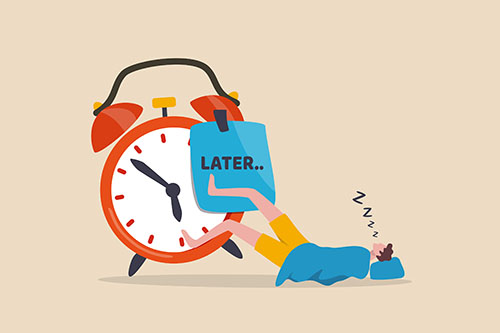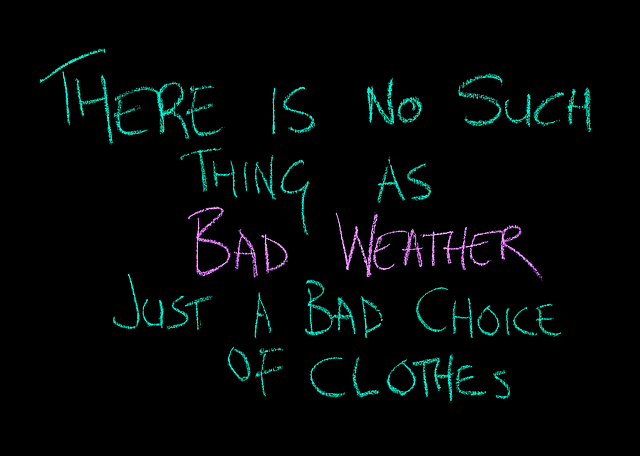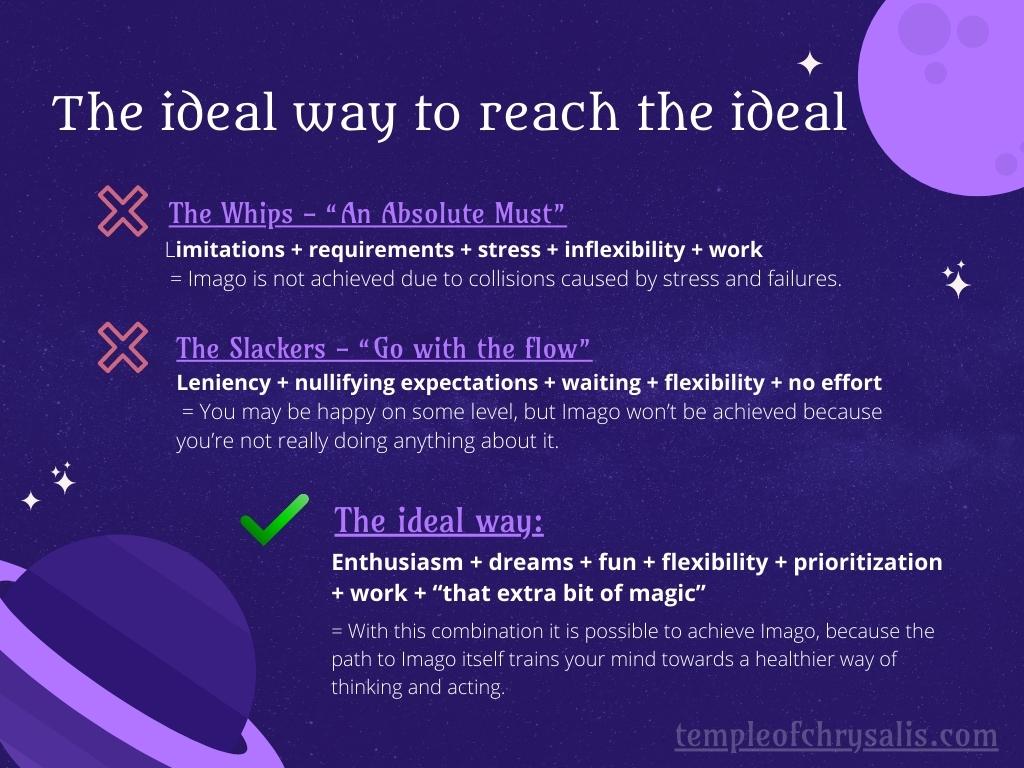
Author
Luminary Blackthorn

Translator
Archon Zimri
One of the fundamental parts of the Temple of Chrysalis’ system is the concept of Imago. In short, Imago is your ideal self. The best version of yourself.
Imago is both a concrete and a spiritual state. What we want to be in our day-to-day lives and what we want to project outward, as well as what we experience internally and, on an abstract level, spiritually.
The Imago looks good on the outside AND feels good on the inside for us.
However, the observant person can find a small contradiction here. In order to develop some concrete skill, trait, or characteristic, we need to make an effort to do so. For example, if you want to become a great chef, you have to study, practice and work to develop your skills and know-how. Effort and work can in turn bring stress. At the same time, spiritual well-being is often specifically about letting go of stress and demands.
If you define Imago through concrete qualities and skills, a question quickly arises: Isn’t this quite a heavy workload to carry? If, on the other hand, looking from the spiritual side, another question arises: How can anything be achieved if you let go?
The Slackers and The Whips – The Contradiction of Spiritual Doctrine
The spiritual realm seems to be full of two opposing views:
- “Expectations and demands create distress. Let go of them in order to be happy. ”
- “In order to really get what you want, you have to pursue it as if it were the last thing you do.”
There are tremendous misunderstandings about both doctrines, and I don’t think the situation is as black and white as these two doctrines make it appear to be. Chrysalis’ perception, of course, is getting after it, putting in work and effort, rather than just the polar opposite of smoking a joint on a couch, laid-back from day to day waiting for things to happen to you. But if the execution of the work starts with punitive whipping, we’ve definitely put the cart before the horse. I, if anyone knows – I’ve done it myself.
Both of the doctrines can be seen as advice. They aim to help a person toward something, but at the same time, each of them alone leads to the opposite. Our brains are not made to rigidly follow either guideline to the fullest. The concepts of letting go of something and going after something are both important and they help balance one another.
The Slackers

Let’s talk about the people who let go of their expectations, for example, under the name “The Slackers”. I’ve not really seen, found nor met a person who has let go from all of their desires, dreams and goals, while being truly happy. On the flipside, I have seen an infamously high amount of people who’ve become passive by letting go. Often the passivation also degrades human functionality. A happy brain needs stimulation. Lack of stimulation leads to a feeling of purposelessness, and that can, in-turn, easily lead to depression.
I have seen this as a workable solution when the desire of the person is in some way aligned with a relaxed and lenient lifestyle. But even then, making a relaxing lifestyle possible usually requires work. I know, this might sound counterintuitive. At its worst, the Slacker explains their own procrastination with “relaxation” and wakes up on their deathbed realizing they’ve relaxed through their life, not really getting to their goal. They make plans to travel somewhere exotic for years and years and move the things they want as far into the future as they can so they don’t have to put in “too much” effort. Or, they take it so easy, that they’ll have a hard time maintaining a basic sense of security.
For example, if you only take it easy and relax, it might become difficult to always have something to eat or a way to get a roof over your head. At that point the “letting go” -attitude might be not so relaxing anymore as you can’t really say you’re happy if you find yourself struggling with basic sense of security. It’s going to be a lot easier to go with the flow and “be one with the universe” when you have at least a full belly and a roof over your head. You can see that taken to the fullest, this way doesn’t necessarily lead to happiness in all cases.
The Whips

… And then there’s the other extreme – The Whips. People who have grimly go after and chase “that something” without knowing how to stop even for a moment to enjoy what they already have. Once a thing on the way to that something has been achieved, the next step must soon be lined up on the horizon, or the whips source of self-esteem will wither. Therefore, the whip desperately heals their internal wounds by performing and executing tasks. The moment of achievement is only a fleeting moment. After that, the feeling of emptiness creeps back and the Whip needs to find a new goal to reach, new thing to achieve on the way to that something.
The Slackers are not as sensitive through Chrysal. Whips, on the other hand, are in a constant fierce Chrysalis loop, where the caterpillar itself eats its own enclosure as it builds. And even if it manages to hatch at last, it is so exhausted that the wings have not had time to develop with them.
The Slackers might not get through their Chrysalis as easily, but the Whips’ way of dwelling in the state of continuous improvement, needing to give everything, using up every bit of energy as quickly as it’s available isn’t the answer either. Being in a constant state of Chrysalis, re-consuming everything you’ve built in-order to build the same thing again isn’t fruitful.
You might end up getting to the other side of the Chrysalis process, but in a state where you have nothing left. Like having wings, only to realize you forgot to entirely learn how to fly while you fully focused on following the blueprint on how to make wings. Imagine finally hatching as a butterfly, on an amazing flower, but realize you accidentally consumed wings in-order to develop your tongue faster. A pity. Now you can see all the flowers, but you are trapped without your wings. Yeah – technically you achieved the end result. But it is not functional. And you have to start all over again.
A tortured Imago does not fly.
But then again neither does the laid-back Imago, which in its larval phase did not work to get the building materials for its future and now finds itself with just one wing, ‘cos making another one just feels like a wasted effort, after all, you already made one.
(The writer acknowledges the above is totally a very freeform figure of speech about the actual chrysalis having other options than to produce a two-winged butterfly with a tongue. It’s here to help you understand what I mean.)
Expectations

Naturally, there are reasons why it is often thought that a person with no expectations is happy. When we build high expectations, we narrow down how many outcomes we can define as satisfying.
A cake. Let’s use a cake for an example instead of butterfly goo for a moment. Let’s say you order a cake, you can expect a masterpiece that exactly follows the examples you gave from Pinterest, every detail meticulously matched to your order. But, because the cake is made by a human, not a machine, it can be very difficult to fully reproduce your exact reference. The caramel rose doesn’t quite match the placement, and the desired pink of the colored whipped cream is a tad closer to peach than in your order. Do you accept the cake or do you throw it at the pastry chef’s face? Are you offended to your core when you don’t get exactly what you want, or are you happy to take out an incredibly delicious and beautiful cake?
The higher our expectations and the more stringent our requirements, the more vulnerable we are to failure.
If you don’t expect anything, you can’t be disappointed. This is in some ways wise advice to apply in many situations. But not as a holistic philosophy of life. It’s not a philosophy that tells you you’re not allowed to have expectations, to hope or to have dreams. It’s not about telling you that you can’t build your Imago exactly the way you want it to be – the way that matches your dreams and hopes.
It’s about how you build those expectations and how you react if your expectations aren’t met.

Moreover, the idea of not having expectations is abused cynically and quite in the spirit of Trogonoptera. You may have sometimes heard the saying “A pessimist is never disappointed.” Bullshit. The pessimist lives within a damn bubble of disappointment and perpetuates the idea that nothing can satisfy. By the way, that bubble in the head of the pessimist is also an expectation.
In other words, expectations are a way of reality shaping. Expectations can be exploited or sabotaged. The biggest problem with expectations comes when expectations become steadfast on how others, for example, should behave, live, or react.
For example:
“I don’t expect anything from others because they don’t meet my standards.”
In a situation like this, you actually have a lot of expectations. You have high standards, meaning you have high expectations. At the same time, you have a negative expectation that others will not reach these high expectations. You have condemned others as inferior, disappointing and unsuccessful. That, too, is an expectation.
When reality is so doom and gloom, you won’t see those moments when others succeed. And maybe you don’t count your own successes as successes either. Also, if it happens that the performance of others does not meet your standards, your pessimistic reality will be fed.
Such a world of view makes it very likely that there’s only failure all around.
Instead, by stripping the expectations, a Chrysalid could try to to think more inline of:
“I’m curious and open to see what others bring to the table! I’m eager to see what they can do. ”
The more accurate and inflexible an image we have of our Imago, the more sensitive it is to exposing us to feelings of failure.
“You’re not supposed to grab a stomach ulcer and heart disease along on your way to your Imago.”
The key principle is to use reality shaping when setting expectations. If our expectations are positive, our attitude will be better. An optimistic outlook on life brings positive things to us. It’s kind of an enthusiastic dream.
Instead, if our expectations have an oppressive and negative tone, the expectation suddenly turns into a negative requirement.
First we want to see what is already part of our reality. If part of our own reality is that “This thing is gonna fail anyway,” we subconsciously begin to act to make our reality come true. This applies not only to concrete thoughts, but also to whether we think negatively or positively. For example, if you approach your work with disgust and you don’t like what you do at all, you won’t notice the opportunities to achieve something else, and you won’t enjoy successes – if you even recognize successes.
A recent example could be our Online Grand Ekklesia. Our first truly international event. My old self would have condemned the event from the beginning to fail and thought that “everything is going to be a mess”. But instead, I decided that if someone is such an infinitely great person that they want to help with coordinating the event, as a leader, I’m going to love the person to bits and support and help as much as I can. With that kind of mindset, my focus has remained on just how well the team has accomplished things. If I had set out with judgmental expectations, my focus would be on every single thing that doesn’t go exactly as I’d like it to or had planned to. And that would not have been a very fruitful way to approach this. In the end, what really matters to me, is the whole and all the good that people have accomplished.
When we spend more time focusing on the good that people bring, our own state of mind is also better. In addition, we radiate positivity, which in turn helps the well-being and sense of security of the people around us.
However, if we didn’t have any expectations or hopes, we would set the bar way too low. Therefore, it is not a question of whether you have expectations or not, but of how flexible your expectations are and whether you accept the moments when your expectations don’t turn out exactly as you set them… As well as how you would react if someone else didn’t act the way you imagined he or she should act.
And now a sports analogy! Think of your Imago as the goal where you have to hit a puck. (I’m Finnish so our example shall be ice hockey) If the goal is small, you obviously have a lower chance of hitting the puck in it. You may end up sending a puck after a puck, missing barely. If, on the other hand, the goal is wide, you’ll have a much higher probability of hitting the puck in it.
That doesn’t mean you have to settle for a wider goal just ‘cos it is easier. If you want to aim for a smaller goal – that is, you have a specific and precise dream – it is perfectly acceptable. Then you just have to accept that you may not succeed the first time. However, you can improve your chances by training and studying to eventually become a better user of the stick that you’ll hit even a smaller goal.
Negative expectation + realization = Disappointment
Positive expectation + unrealization = Disappointment
Expectation of negatives + unrealization = Cynical positive surprise
Positive expectation + fulfillment = Satisfaction
No expectations + failure = Slight disappointment (nothing actually lost)
No expectations + success = Slight satisfaction (nothing actually achieved)
Attitude change: From anticipation to a dream
After all, would it be better not to want anything? Even go as far as become a Buddhist and let go of everything? No.
The idea that all expectations should be removed is, in my view, inhumane, as it would exclude traits that are natural to us as humans.
For example, it is natural to want to experience a sense of connection. It is natural to want a partner. And it’s also totally okay to want a partner with whom you can experience that sense of connection. I think it’s reasonable to want to experience different experiences in a lifetime, or, for example, to want to travel.
In addition, many wonderful and wonderful things in life can be missed if you let go of everything. Of course, that too may be okay. But I personally don’t want to be the one who wakes up on my deathbed to the fact that I’ve been staring at Netflix all my life because “You see a person is truly happy when they expect nothing. You have to take it easy! ”
It is a question of balance. About knowing when to set expectations and when not. In principle, the less stressed we are, the less demands we make. But stress is a tool that can also be exploited, and sometimes stress is needed to get ahead.
“A tortured Imago doesn’t fly”
So it is a matter of choice when we choose expectations and when we understand to let go of them.
What if you translate the term “want” into the word “dream”? Does it change the way you go about pursuing what you want? There is little stress associated with the idea of dreams. A dream is a light, positive desire.
Achieving an Imago happens with the least damage when we create the Imago out of dreams, knowing at the same time we can make it happen. So instead of thinking “oh horrible, now you have to constantly kick yourself in the butt toward a higher self”, we make the process fun.

The end result
It’s all about balance. If you let go of all your desires, you will get random things from the universe. It may be quite satisfying, but it’s not really Imago. It’s just your version that settles for realities. Also, don’t fool yourself by repeating a mantra that you can fail to do things because “a spiritual person doesn’t perform”.
If, on the other hand, you are chasing Imago by the sweat of one’s brow, with teeth clenched and whipping yourself onwards, the end result will not be Imago either. Then the result is a burnt-out martyr who is likely to sway between moments of feeling crushed and momentary successes, yet never achieving an ideal. You’re not supposed to grab a stomach ulcer and heart disease along on your way to your Imago. In order to achieve, you have to learn how to let go.
It’s not about whether you perform or not, you wait or don’t, but how you do things and what attitude you have when you do. That’s why Chrysalis is such a holistic system. Concrete steps will never take you towards Imago unless your state of mind is properly tuned.
So it all starts with you. About internal dialog, treating trauma, being aware of your defenses, clearing out excuses, and eradicating toxic practices.
Fuck all the “but what if”. Make the radical decisions that need to be made. Try the other extreme for what your current extreme is.
And one day you’ll realize your arrived to a place where you are and feel like a really happy person, and then. Dare to stop.








No comment yet, add your voice below!